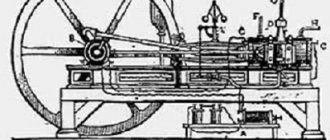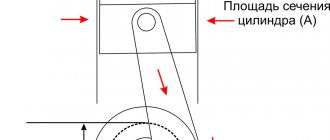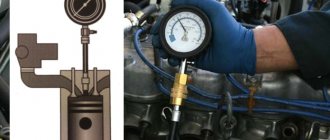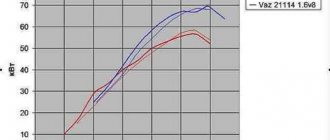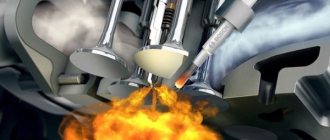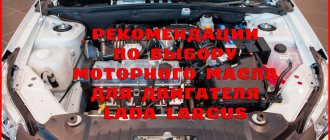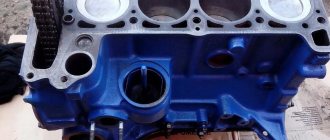The engine runs like a diesel, causes and symptoms
The malfunction should not be confused with a banal tripping or misfire.
Both the noise and the nature of vibrations in this case are different. Why dieselize a gasoline engine?
One of the main reasons is detonation in the cylinders. Moreover, in order for the characteristic diesel sound to appear, problematic processes must occur in all cylinders simultaneously. Accordingly, the reasons will be common to everyone.
No matter how trivial it sounds, low-quality fuel is often to blame. After refueling at a questionable gas station, the symptoms appear, then, after changing the gasoline to the “correct” one, the problem disappears. Flashes in the cylinder when using bad gasoline occur earlier (later) than expected, and the valve operating phases are adjusted as expected. Because of this, a mismatch occurs.
A gasoline engine can also “diesel” due to the fact that the exhaust gas exhaust system is leaky. If a gasket burns out on one of the cylinders, you will hear a characteristic chirping sound (the exhaust “squeaks”). And if there is a problem with the entire exhaust manifold, you can hear a tractor sound. In this case, there are no secondary symptoms (vibration). Acoustic effects only.
Wear of the connecting rod and piston group can also cause the phenomenon in question. Backlashes appear at the rotation points, dull knocks are heard from deep within the engine, in general, the engine runs like a diesel engine. The problem is not so terrible, it’s just that your power unit requires a major overhaul with the replacement of the crankshaft liners and connecting rod pins.
The valve train is sometimes also the source of the problem. Most often, it is enough to adjust the gaps (applies to inexpensive motors with mechanical adjustment). On models equipped with hydraulic compensators, the range of problems is much wider. In case of critical wear, it will not be possible to restore normal operation. These elements need to be replaced.
There is a simpler reason: insufficient pressure or oil level (for hydraulic compensators, these are practically the same thing). The cavities are drained and the tappets knock on the valve journals.
The following can also lead to “dieseling”:
- Wear of valves (bed wear). Simple play leads to a characteristic diesel knock, especially when driving at low speeds under tension.
- Problems with the fuel supply and ignition system. But these are not the most obvious reasons, rather “catalysts” for an existing malfunction in other components.
- And finally, the most dangerous malfunction is the gas distribution mechanism. If a timing chain is used, characteristic sounds appear when it sag. If there is a clear imbalance in engine operation, the cause may be a phase shift in the camshafts. For example, due to the chain jumping 1-2 gear teeth. Similar symptoms occur with a timing belt drive. The culprit is torn out belt teeth, stretching, play in the guide rollers, and wear of the tension system.
If the engine rumbles like a diesel engine, it is necessary to urgently eliminate the cause
Why can’t you operate a gasoline engine with such malfunctions? With the so-called “dieseling”, the internal combustion engine is subjected to strong mechanical stress. Any malfunction under this operating mode only progresses. In addition, the chain of breakdowns grows like a snowball.
The most minor problems are: loss of power, increased fuel consumption, discomfort when driving the car. Even if symptoms appear when warming up (or disappear after the engine warms up), urgent diagnosis is necessary.
Ceed 1.6 122hp. When the engine is cold, it “diesels” a lot and you can clearly hear a knocking sound (either from the chain - but it’s fast for the chain, or from the valves). When it's hot, the sound decreases (when it's hot, this sound is interrupted by the clutch knock).
About the concept of running like a diesel
Pure-Seven Blog Unstable engine operation
What is meant when we talk about a gasoline engine operating like a diesel engine? As you know, a diesel engine is characterized by rougher operation and is characterized by knocking. This is explained by the fact that the mixture is ignited not by the spark plug, but by compression. A malfunction of a particular engine system can be identified by characteristic noises, knocking noises and the overall behavior of the engine. The problem can also be judged by the color of the exhaust gases. If you hear that a gasoline engine is unstable, knocks like a diesel engine, or troits, then the reasons may be the following:
- the first is fuel, or rather its low quality or inadequacy;
- malfunctions in the fuel supply system;
- malfunctions in the lubrication or cooling system;
- The timing belt or CPG is worn out or faulty.
As we can see, there are many options why a gasoline engine works like a diesel engine.
Let's take things one by one and start with fuel quality. In addition, do not forget to check the oil level in the engine. A gasoline engine can operate like a diesel engine due to the low octane number of the fuel, i.e. the fuel is not suitable for the engine in your car. If the reason is low-octane fuel, then you can hear it when starting the engine cold, and during further driving you will also hear it. This knocking sound is called detonation in the engine cylinders. It is impossible to say with confidence that the sound is similar to the operation of a diesel engine, because it only vaguely resembles it. Detonation can be clearly heard when the engine is running under load while accelerating the vehicle. The nature of the knocks is ringing and resembles the impact of metal on metal at high frequency.
Fuel is not the only thing that can cause detonation. The reason may be a faulty knock sensor, as well as on a car with a manual transmission when driving in high gears at low speed. Another option is that quite dense carbon deposits have formed on the valves and in the combustion chambers. On engines where the OZ is set manually, detonation may also occur due to incorrect settings. As a result, the mixture burns out already on the exhaust stroke, while the engine runs roughly and with characteristic knocking noises. If fuel with a low octane number gets into the tank of your car, you can correct the situation by refueling with the appropriate gasoline or adding a special additive.
Knocks due to detonation
To identify the problem and answer the question why a gasoline engine began to knock like a diesel engine, you must immediately start by checking the quality of the fuel and the level of the engine oil. A gasoline engine can operate like a diesel engine due to the fact that it is filled with low octane fuel, which is not suitable for this type of engine. Increased noise when the engine is running on low-octane gasoline will partially appear during a cold start, and is also very noticeable during further driving.
The cause of the knocking is detonation in the cylinders. It is worth noting that the detonation is vaguely similar to the muffled “diesel” sound. Modern gasoline units are equipped with solutions to counteract detonation, but the possibilities for making adjustments are within narrow limits. The ECU is only capable of slightly shifting the ignition timing (ignition timing).
The appearance of detonation knocks can be clearly heard at the moment when the engine is under load during acceleration of the car. The knocks are loud, reminiscent of high-frequency impacts of metal on metal. Also, detonation can be caused by a malfunction of the knock sensor, driving in high gear in cars with manual transmission at low crankshaft speeds, dense carbon deposits on the valves and in the combustion chambers. Detonation is also caused by incorrect settings (ignition too late) on cars where the OZ is set independently. The working mixture burns out on the exhaust stroke, causing the engine to work shockingly and roughly.
Detonation under normal conditions is heard when a manual car is going up a hill, but the driver does not downshift, trying to maintain the set speed by pressing the gas pedal to the maximum. The car moves, but does not accelerate further, the engine does not gain momentum. It turns out that the internal combustion engine does not “pull” in high gear under load. In such conditions, the ringing knock of detonation appears most clearly.
If the engine has a high mileage, then worn pistons in the cylinders may knock when “cold”. The sound is uniform, reminiscent of muffled knocks, a bit like the sound of a diesel engine. The intensity will decrease as the engine warms up after a cold start. Once it reaches operating temperature, as well as while driving under load, the “diesel” knock disappears. The car can be operated in moderate mode, but you should not delay the repair of the internal combustion engine.
Glow plugs, relays and control unit
BMW 5 series Logbook Idling, unstable engine operation
It happens that the battery is charged, the starter confidently turns the crankshaft, but the diesel engine still does not start. The problem may be a faulty glow plug. The fuel that enters the diesel cylinders is additionally heated. The diesel fuel in the cylinders is heated by the glow plugs of a diesel engine.
These spark plugs make starting a cold engine easier. The glow plugs are powered through a relay and have a control unit (timer) that controls the heating of the plugs taking into account a given amount of time. After a certain operating time, the relay stops supplying voltage to the glow plugs. In some engines, glow plugs heat diesel fuel until the diesel engine reaches operating temperature completely.
Malfunction of glow plugs does not always occur. A cold diesel engine can start normally in warm weather, as well as “hot” if one or even two spark plugs fail.
With the onset of cold weather, starting a diesel engine with one non-working glow plug is very difficult, but possible. After starting, such a motor will work unstably until it warms up. To check the glow plugs, they are first unscrewed. Next you need to measure their resistance.
Problems can be associated not only with the spark plugs, but also with the glow plug relay. During normal operation, the relay makes quiet clicks when the key is turned in the ignition before starting. The electronic unit that controls the spark plugs may also be faulty. If the characteristic clicks of the relay are not noticed when you try to start the diesel engine, then a malfunction of the relay or unit is likely.
Diesel engine
Lada Granta WHITE LEXUS Logbook The check light came on. Emergency engine operation
Pros:
- Low fuel consumption
The obvious reason for the popularity of diesel in commercial vehicles. And among car owners too. And despite the fact that modern gasoline engines can also boast of fairly low fuel consumption, diesel engines still have this innate. At the same time, a diesel engine has greater efficiency and torque due to a higher degree of fuel compression and the nature of its combustion.
Low transport tax
With the same volume, a diesel engine has less power (and higher torque, but we’re not talking about that now). And the transport tax in Russia, as you know, is calculated based on the number of horsepower.
Environmental friendliness
Despite recent scandals with automakers, diesel is still the most environmentally friendly of internal combustion engines. Only hybrids and electric cars are greener.
Durability
Unlike gasoline engines, which have been cursed by downsizing in full force, in our country diesel engines are still focused more on commercial vehicles. And this simply obliges him to live a long time. A very long time.
Engine sound
The diesel rumbling, which has become the talk of the town, caresses the ear of every car enthusiast who loves loud cars.
Minuses:
lipskiff › Blog › What is the difference between a diesel engine and a gasoline engine?
Each of us strives to save money, therefore, one of the criteria for choosing personal transport, which, as we know, has long ceased to be a luxury, is its engine. Thousands of people every day face the important dilemma of which engine to choose: petrol or diesel. Those who were lucky enough to try both will confidently say that there is a significant difference in both the care and operation of the engine, which we have to consider.
Principle of operation of diesel and gasoline engines:
The principle of operation of a diesel engine is as follows:
the internal combustion engine works like a piston and when compressed, the fuel ignites.
Fuel is supplied to the cylinder separately from the air. ( A diesel engine (in common parlance - diesel) is a piston internal combustion engine that operates on the principle of self-ignition of atomized fuel under the influence of air heated during compression
).
The operating principle of a gasoline engine is as follows:
with the help of spark plugs, the supplied air-gasoline mixture is ignited at a certain moment, driving the engine. (
Gasoline engines are a class of internal combustion engines in the cylinders of which the pre-compressed air-fuel mixture is ignited by an electric spark. Power control in this type of engine is usually carried out regulation of air flow by means of a throttle valve
).
Gasoline engine
Pros:
- Simplicity
Even the most advanced gasoline engine in a passenger car will be structurally simpler than a modern diesel engine. And all because diesel is the notorious ultra-high fuel pressure. At such pressures, massive fuel equipment cannot be simple and cheap, even at the level of the materials from which it is made.
Prevalence
The vast majority of cars with gasoline engines are on our roads. This means that most car services know how to handle them. Whereas it can be difficult to find diesel engine specialists even in big cities.
Confident start in almost any weather
A working gasoline engine will always start if there is at least something resembling gasoline splashing in the tank, and there is at least something resembling electricity in the battery.
Machine price
The version of the car with a gasoline engine, all other things being equal, costs significantly less than the diesel version. This is not true for used cars, but when you walk into a showroom with new cars, you can feel the wallet in your pocket sighing sadly at the sight of the prices of diesel cars.
Freedom to choose configurations
Automakers often offer the same car model with several gasoline engine options and, accordingly, several trim levels, and with only one diesel engine. Moreover, most often the diesel version will be equipped with a leather interior that is optional in everyday life and many options that you may never need, but you will still have to pay extra for them.
Minuses:
- Ignition system
If in a diesel engine the fuel ignites due to increased pressure and temperature in the cylinder, then on gasoline engines this is done by spark plugs and high-voltage coils. Despite the factory perfection of these solutions, the ignition system often still requires periodic attention when servicing the car.
Operating ranges
A gasoline engine without a turbine produces maximum torque and power at high speeds. Unlike a diesel engine, which is always ready to accelerate to the best of the available horsepower - almost from idle. Despite the constant progress of gasoline engines, diesel still remains the leader in this direction. This is especially familiar to fans of manual transmissions: while standing in a traffic jam and starting off on a diesel engine, you can simply put off the gas pedal - the car will drive smoothly and smoothly without jerking and jerking, inevitable in a similar situation on gasoline.
Increased explosion hazard
Fortunately, spontaneous combustion of a car is not the most common occurrence on the roads. But whatever one may say, gasoline is a flammable volatile fuel, and in the event of an accident, the likelihood of a gasoline car catching fire is much higher than its diesel counterpart.
Smell
In a working car, this problem will not overtake you. But if they change your fuel pump (and in 90% of cars it is accessible from the interior), then for a long time the specific smell of gasoline in the cabin will not be drowned out by any fragrances. Diesel, of course, also does not smell like ambrosia, but still not so pungent.
Diagnostic problems
If you have a non-standard breakdown in which the engine “stops running”, starts to “twitch” or “triple”, the abundance of “specialists” in gasoline engines can play a bad joke. Half of the services will attribute this to “bad gasoline” and recommend almost replacing the entire fuel system assembly. Of course, a competent diagnostician will be able to find and cure the problem, but you will most likely have to wander among a huge number of service stations that supposedly “know” gasoline engines like the back of their hand.
Gasoline engine sounds like diesel
"Questions": answers.
It's funny that generally simple questions provoked such heated discussion.
There are already enough sensible ideas in the comments to the previous post, so I decided to publish my opinion (which does not claim to be an absolutely correct and completely comprehensive answer) in a brief form, which I am sure you can develop and supplement in the comments. As a result, after reading the comments of this and this post, even a beginner will be able to form a satisfactory judgment on these issues.)" 1. For the most intense acceleration, do you need to switch at the point of maximum torque, or maximum power? Many will simply say from experience that the answer is obvious, but why and what can be an intelligible explanation?” The question in this form is often asked at conferences - it’s almost a quotation. Strictly speaking, the question makes no sense at all. Obviously, there is 101 logical and empirical proof of the fact that in order to create the most effective acceleration, you need to switch to the so-called. “moment of maximum power”, but, I repeat, at first glance, an understandable question, in this case, is simply nonsense. All these logical arguments do not answer this question. Hence the additional task: formulate, if possible, this question in such a way that it makes sense. :)”2.What is the main advantage of a diesel engine, how is it provided, and how is this advantage mainly expressed for the consumer?” He promised briefly: an increased compression ratio and, as a consequence, an increase in efficiency, expressed in fuel economy. The remaining advantages and disadvantages are related not to the principle, but to the specific design. Now a gasoline engine has “absorbed” almost all the advantages of a diesel engine - by the way, there was already an article about this. 3. Why is the sound of a diesel engine at idle noticeably louder than a gasoline engine? A diesel engine has a very short and energy-rich combustion cycle - only about 20 degrees DPKV - a lot of energy is released in a short period of time. Even the most modern and “quiet” commonrail systems have an injection pressure of about 2000 atm - that is, the injection system itself is quite noisy - and the fuel equipment is also noisy. To reduce noise at idle, the injection is divided into portions. Thus, two noise-related problems are solved at once. An example is the BMW N57 - a completely quiet modern diesel engine. 4. Continuing the theme of questions 2 and 3. Imagine that you have made two engines that are extremely identical in design, as far as practice allows, of course. But one of them is diesel, the second is gasoline. The volume of the cylinders is completely the same, the losses are optimized and equalized - two twins in essence, but different in principle. There are no turbines or anything else that interferes with comparison - reference engines from two schools of engine building, made for a laboratory sample. Question: compare them according to the criteria of maximum power, maximum torque, expected fuel consumption. One relative to the other. The easiest way to answer this question is by comparing almost unified engines: BMW M20B25 and M21 (more precisely, the naturally aspirated version of the M21D24W diesel engine). Since power is a function of speed, and a diesel internal combustion engine has the limitation already described in paragraph 3, which makes it impossible to create a high-speed diesel engine, losing in speed, the diesel will lose in power. We look at almost any diesel engine, in this case, it doesn’t even matter so much, with or without a turbine. Due to the higher achievable maximum revolutions, gasoline always wins. The situation with real samples is as follows: 152 Nm for the M21D24W. And something like 220 Nm for the M20B25. Almost 30% of the difference in favor of the gasoline engine is also due to the lower caloric content of the charge. A real diesel engine runs on a lean mixture. So, the situation in practice is something like this: 1. Maximum power is noticeably higher for a gasoline engine. Due to revolutions. There are no options here. 2. The maximum torque is noticeably lower for a diesel engine, due to the lower calorie content of the charge - a real diesel engine produces maximum torque in a lean mixture, while a gasoline engine produces maximum torque in a rich mixture. This is where an option appears - what prevents the experiment from making the mixture as rich as possible, close to stoichiometry, and then the moments should be approximately equal. EURO 6 toxicity requirements are about to force manufacturers of diesel internal combustion engines to enrich the mixture for the sake of the environment - this is one of the effective ways to reduce emissions. 3. Specific fuel consumption in practice is lower for a diesel engine due to the compression ratio (efficiency) and, with an equal volume of blocks, due to lower power/torque density. The latter is a consequence of the operation of a diesel internal combustion engine in the range from ultra-lean to lean mixture, while gasoline operates in the range from an almost stoichiometric mixture to a rich one. So, in the case of a pure laboratory experiment, no one bothers to normalize the mixture to stoichiometric and even make it rich , which should in theory almost equalize the moment. Taking into account the original formulation of the problem and the slightly higher specific caloric content of diesel fuel, but at the same time slightly higher friction losses, the moments of laboratory internal combustion engines will most likely be approximately equal. 5. List the functions of a car shock absorber. And can you name the main function? The shock absorber has several obvious functions, but I would say the main one is the ability to maintain contact of the wheel with the road (maintain controllability). To illustrate, you can take two different shock absorbers and, on the same track, measure the time that the wheel maintains contact with the road surface. This will be the conditional coefficient of performance quality of this element. Tags: questions, answers Tags: A gasoline engine sounds like a diesel engine
Periscope EvgeniiKuleshov I am VKontakte Odnoklassniki ok.ru/profile/573420614339 Life channel …
AUTO | Topic author: Apolo
Causes of engine detonation when turning off the ignition and starting.
• The phenomenon of engine detonation is familiar to almost every car owner. Most often it occurs when driving uphill in high gear at low speed. The sound of an internal combustion engine (ICE) is mixed with a hard metallic knock, which many mistake for the knock of piston pins.
— What is detonation?
• Detonation is the process of explosive ignition of the working mixture in the engine cylinders. While the normal speed of propagation of the flame front is about 30 m/s, during detonation the fire spreads tens of times faster - up to 2000 m/s.
• Under normal conditions, the mixture begins to ignite when the piston is slightly short of top dead center, the ignition timing is usually 2-3 degrees. The flash ends after the piston passes TDC. In the event of detonation, the mixture ignites in the middle of the compression stroke. The piston experiences strong resistance, as a result, engine power is lost and fuel consumption increases significantly.
• This phenomenon is never good for the engine, but detonation can be divided into acceptable and unacceptable. In the first case, it is not always possible to even notice it. It usually occurs at low speeds and does not last long. Most often, this happens in small-volume engines with relatively high power and torque (for example, 107 hp and 135 Nm with a volume of 1.4 liters). Unacceptable detonation, as a rule, occurs in forced internal combustion engines under increased loads at high speeds. After just a few seconds of operation in such conditions, the motor can suffer critical damage.
• There is another phenomenon that car owners often confuse with detonation - dieseling. After turning off the ignition, the engine continues to run jerkily, sometimes with an increase or decrease in speed, while the sound of the engine is metallic, similar to the sound of detonation. This is a different kind of phenomenon and the reasons for its appearance are different: when the engine is turned off, the gasoline in the cylinders spontaneously ignites due to the high compression ratio, as in a diesel internal combustion engine, hence the name. Dieseling should not be confused with glow ignition - during shutdown, the working mixture is ignited by the heated electrodes of the spark plugs and soot.
— Why is detonation dangerous?
• The entire crank mechanism and cylinder head are subject to destructive loads that can, with prolonged exposure, lead to failure of the internal combustion engine. In addition, the temperature in the cylinders also rises to unacceptable values (up to +3700 degrees), which threatens burnout of the cylinder head gasket, as well as corrosion of the piston bottom and cylinder bore.
• block head lining is the first part that will become unusable due to detonation. It can only withstand short-term operation under extreme thermal and mechanical loads. The worst risk of detonation is replacing the cylinder block, crankshaft, piston group and cylinder head.
— Causes of detonation:
• The reasons why this phenomenon occurs can be divided into three groups:
• octane number of gasoline; • design features of the internal combustion engine; • vehicle operating conditions.
— Effect of octane number:
• Unlike a diesel engine, in which ignition of the working mixture occurs due to a high compression ratio, a gasoline engine uses an ignition system for this purpose. The mixture of gasoline and air is ignited by a spark that occurs between the electrodes of the spark plugs.
• The compression ratio of gasoline engines is much lower, this is due to the fact that gasoline is not as resistant to detonation as diesel fuel. The main characteristic of gasoline is the octane number, which reflects its resistance to detonation. The higher it is, the more the air-fuel mixture can be compressed.
• If a car whose power unit is designed to use fuel with an octane number of at least 95 is filled with AI-92 gasoline, then with a high degree of probability it can be argued that under high loads the working mixture in the cylinders will detonate.
• However, the problem may also occur if the fuel brand complies with the manufacturer's recommendations. It's all about the quality of gasoline. Unscrupulous sellers often increase the octane number on their own by adding liquefied propane or methane to the fuel. These gases evaporate very quickly, leaving low-octane gasoline in the tank.
• Due to the detonation of low-octane fuel, carbon deposits are intensively formed in the combustion chamber, which, in turn, can cause a phenomenon such as glow ignition. In this case, the engine continues to run even after the ignition is turned off. The reasons for its occurrence are that the fuel-air mixture is ignited not by a spark, but by the hot electrodes of a spark plug or soot.
— Influence of design features:
• The causes of detonation may lie in the design features of the engine. These include:
• compression ratio; • combustion chamber shape; • the shape of the piston crown; • presence of supercharging; • location of spark plugs.
• So, the higher the compression ratio, the more prone the internal combustion engine is to detonation. The same can be said about supercharging systems (“supercharged” engines require high-octane gasoline).
— Influence of operating conditions:
• The conditions in which the machine is operated also play an important role. Detonation may occur when driving in high gear at low speed. So, if you try to drive up a mountain in fourth gear at a speed of 30 km/h, a characteristic metallic knock will immediately be heard from under the hood.
• The correct operation of the ignition system (the working mixture in the cylinders detonates during early ignition), the serviceability of the engine cooling system, and the presence of carbon deposits on the pistons and combustion chambers have their influence. Car owners who try to reduce the car's appetite by any means are putting themselves in danger. For this purpose, the electronic control unit is “reflashed” to prepare a leaner mixture than necessary. As a result, the dynamics of the car deteriorate, and under increased loads detonation occurs. #interesting AUTO All about cars and roads: news from car markets and reports from world car shows, test drives of new car products... JOIN https://ok.ru/pubauto For advertising issues and cooperation 247K participants
Diesel sound from a gasoline engine - Toyota logbook...
After purchasing the car, an unpleasant sound appears after warming up. Like the whirring of a sewing machine, the sound of a diesel engine. Pores forums was found...
uvlechenie.info
Timing faults
Breakdowns or wear of timing parts (gas distribution mechanism) can also be involved in the appearance of extraneous sounds under the hood of a gasoline engine. The most common faults:
- Valves are knocking. This disadvantage is inherent in older gasoline engines, which required periodic valve adjustment, even during the first annual maintenance. Knocking can be caused by unqualified repairs (poor fit of the valve plates to the seats), as well as deformation due to overheating of parts.
- Hydraulic valve compensators are knocking. Modern valve mechanisms equipped with automatic adjustment are more durable, however, even in this case, the hydraulic compensators wear out sooner or later, after which they should be replaced.
- The timing chain drive is loose or worn. In this case, the dangling chain touches the guard cover, which causes a rattling knock.
- The timing belt jumped several teeth, causing the valve timing to be disrupted. The engine runs harshly, untimely combustion of fuel causes a characteristic diesel sound.
- The bearing beds of the camshaft are worn out, which causes noticeable knocking noises, especially when the engine is not warmed up, when the gaps in the bearings have not yet been cleared.
Why does this happen
There are a lot of reasons for this, but they are all connected with one timing system (gas distribution mechanism). A little history for understanding.
Manufacturers around the world, including domestic ones, have always struggled with the quietness of car operation. Remember the first rear-wheel drive VAZs (01, 02, 03 - 07). They all had similar engines, they worked relatively quietly when they were new, but then they began to make a lot of noise, this happened already at 10 - 15,000 kilometers (I myself had many such cars, so I know first-hand) to get rid of this sound, it was necessary to adjust the valves (by the way, such “noisy” operation also affected the consumption and stability of the engine).
This was a fairly common procedure on a classic drive. The reason for this was the development, as well as the expansion of the metals that the valve wore (or rather its upper part), onto a special cam. In general, the design was not so perfect; it had to be adjusted periodically. The noise disappeared, and the engine thrust became better. But soon another timing mechanism was invented, which included “hydraulic compensators” in its design. They already made adjustments automatically, and the noise did not appear for many thousands of kilometers, it was really a “leap” forward, the only thing needed was good oil (this is where synthetics and semi-synthetics begin to appear). However, after a lot of wear and tear, the rumble and “dieseling” still appeared. Now I will try to tell you point by point:
1) Oil.
It’s corny – but it’s true! If you fill in the wrong oil that your car is supposed to, and God forbid you run into a fake, then your unit will let you know with “diesel” sounds - it will make noise. This also manifests itself with high mileage on one oil (20 - 30 thousand), this should not be done under any circumstances! You will kill the engine. Change the oil only to normal oil, buy from trusted stores.
2) Hydraulic compensators.
These devices may fail, the engine will make noise and operate unstably. We just change it, this was especially common on our VAZs.
3) Production of camshafts and valves.
Despite today's almost perfect technologies, wear is also present in these parts, mainly in the places of contact - the shaft and the valve “mechanism” (there can be all sorts of cams, nickels, etc.). True, this happens at very long distances, I think closer to 200 - 250,000 kilometers.
4) "Pastel" camshaft.
For some car models, the pastel (shaft mount), even when new, may be slightly wider than necessary. Therefore, when you start the engine, you may hear a strange rumble (similar to the operation of a diesel engine), but after the engine warms up, the metal expands and the gap decreases, so the rumble goes away. By the way, this can occur on almost all car models due to the high wear of this fastener - the pastel.
5) Timing chain and its tensioners . ON many cars, the timing chain can stretch, for example on powerful versions of the TSI engine; of course, it has “tensioners” that keep it in place (tensioned). However, the stretching is often very high, this will cause an incomprehensible rumble in the motors, which indicates one thing - you need to change the chain and the mechanisms that tension it. This is a very popular fault on many cars, both well-known brands and our classic VAZs.
6) Timing belt and its tensioning system . Almost identical to the chain, however, the belt itself does not make noise, and it breaks more often than it stretches. But its tensioning system can make noise; as a rule, there are rollers that fail over time, so they will also need to be changed.
7) The valves themselves . This often manifests itself during a major overhaul; perhaps the technician did not “lap” (fill the mirror) the valve correctly. Thus, it does not close correctly, it encounters an obstacle - such sounds are possible. True, it’s quite easy to check in which cylinder there is such a sound, you need to look at the compression in it, if it is at a low value, then it’s definitely the valve.
These are probably all the reasons why the engine is “diesel”! I tried to reveal the problem as much as possible.
Now a short video version of the article
How can these problems be solved?
Having determined what problems may result in the engine running loudly, we will try to consider their solution:
Solving problems with the thermostat or gas distribution system will require turning off the engine completely and cooling it. This situation can occur when a very small gap is installed in the valves. In this case, the engine operates jerkily. To eliminate the problem, you need to use a feeler gauge to set the required gap size. After which it is recommended to check the tension of the belt drive. The thermostat can cause problems by leaking excess fluid. This leads to insufficient cooling of the engine, and as a result, its loud operation. To get it to work properly, you need to thoroughly clean the thermostat or replace the old one with a new one.
Thermostat
- Now let's look at the next problem - late ignition. Upon release of the incoming mixture, combustion continues. In this case, it is recommended to set the octane corrector to the zero position. If the engine begins to operate intermittently, it is best to loosen the distributor housing and adjust the ignition using the control lamp. In this case, it is necessary to eliminate the play of the slider - to do this, holding it with your hand already during the ignition process, re-fasten the housing.
- Unstable engine operation may indicate a problem with the carburetor. This problem can be detected if there is a smell of gasoline, which is especially noticeable when the hood is opened. This may also be accompanied by the accumulation of fuel liquid - this indicates that the seal is broken. To get rid of these problems, remove excess fluid and clean the intake tract. For this purpose, it is enough to idle for a few minutes. A violation of the tightness indicates wear of the valve, which is best replaced with a new one or restored the old one.
- During operation, loosening or oxidation of clamps and wiring terminals may occur. To solve this problem, it is enough to carry out the usual cleaning of contacts and connection points.
- The use of fuel that has a low octane number may cause the propulsion system to operate excessively loudly. To fix this problem, you need to switch to gasoline of the brand recommended by the car manufacturer. This will solve many problems that may arise on our roads and, as always, at the most inopportune moment.
How to fix the problem
Each specific case has its own algorithm of actions. If it is determined that the rumble is a consequence of using low-quality oil, you just need to switch to another fuel oil. It should be remembered that it is inadmissible to use oil without changing it for a long time. The same applies to broken hydraulic compensators, valves and camshafts.
The problem of a loose timing chain is easily solved - the chain needs to be tensioned. Although the chain can stretch so much that it is no longer possible to tighten it. Then the chain drive must be replaced. If a timing belt is used as a timing drive, it will also have to be changed, and this must be done together with the tension rollers. The problem with valves is also solved by replacing these elements.
To avoid engine diesel build-up, it is better to use only high-quality oil and change it more often - at least once every 10,000 km. It is the use of low-quality working fluid that causes an unpleasant rumble, similar to the noise of a diesel engine. In addition, it is important to use high-quality gasoline and constantly monitor the timing drive. The absence of a rumble similar to the noise of a diesel engine can only be guaranteed if these conditions are fully observed.
Automatic transmission slipping: reasons
If the automatic transmission slips, the engine speed increases greatly, but the speed does not change, shocks, noise and unpleasant sounds appear. This problem must be diagnosed immediately! We will tell you how in this article.
Power steering hums when turning the steering wheel
If the power steering hums when you turn the steering wheel, this is a sign of a problem with the steering. To avoid problems with driving the car, this malfunction must be eliminated as quickly as possible.
The power steering is buzzing: what is the reason?
Power steering is needed to make driving easier, and when it starts to hum, it indicates a malfunction. We will tell you why the power steering is humming and how to deal with this problem yourself.
A little history of the diesel engine
In 1890, Rudolf Diesel developed the theory of the “economical thermal engine,” which, due to strong compression in the cylinder, improves efficiency. Diesel became the first person who managed to patent his theory, although similar ideas had been expressed somewhat earlier by Ackroyd Stewart. His idea was to draw air into the cylinder and, after compression, it was pumped into a container into which fuel was also injected. Reklama: INTELLECTUS anglų kalbos kursai suaugusiems ir įmonėms bei vasaros dienos stovyklos Kaune, Vilniuje ir Klaipėdoje https://intellectus.lt/dienos-stovykla-vilniuje/ To start the engine, it was necessary to heat it with a lamp from outside, and after starting, it worked without required heat outside.
Rudolf Diesel
E
Stewart did not consider the benefits of high compression, he simply experimented with the possible exclusion of spark plugs from the engine, that is, he failed to pay attention to the only important and large advantage - fuel efficiency. Therefore, the theory of R. Diesel formed the basis for the creation of modern engines with compression ignition
Most likely, this was the reason for the name “Diesel engine”, “diesel engine” and so on.
Diesel formed the basis for the creation of modern compression ignition engines. Most likely, this was the reason for the name “Diesel engine”, “diesel engine” and so on.
Nozzle knocking in a diesel engine: causes and solutions
Diesel engines are almost always noisier than their gasoline counterparts. The ringing of detonation, the rattling sound emitted from a running engine - all this is typical for the operation of a diesel engine. This noise is caused by the compression of air in the cylinders and the ignition of fuel as it is introduced into the cylinder. At the same time, the rattling would be the same in a gasoline engine with such a malfunction as early ignition. The timing of fuel injection into a diesel engine is critical to prevent some parts from breaking down.
The thing is that a diesel engine works differently than its gasoline counterpart. In a gasoline engine, fuel is mixed with air and then compressed before an electric spark ignites the mixture. In a diesel engine, only air is compressed. The fuel is then injected into the compressed air cylinder and the heat from the compressed air ignites the fuel without the aid of an electrical ignition.
The rattling sound of a running diesel engine is the sound of the fuel injection process. Injecting cold diesel fuel into extremely hot compressed air causes the fuel to ignite while the piston is still rising to top dead center in the cylinder, resulting in detonation and a subsequent rattling sound, which is characterized as rattling. The compression ratio typically affects how loud a diesel engine rumbles—the higher the compression ratio in a cylinder, the louder it runs.
While gasoline engines typically operate in compression ratio ranges from 8:1 to 10:1, a typical diesel engine operates in compression ratio levels from 14:1 to 25:1. This higher compression ratio allows the diesel engine to operate more efficiently than its gasoline cousin. Thus, a diesel engine rattles because it is a byproduct of the increased compression ratio, or more accurately, the fuel injection process.
By the way, the diesel engine has the design property of being difficult to start in cold weather due to the lack of an electronic ignition system. To combat this, many manufacturers equip diesel engines with glow plugs to make starting easier in cold climates. Glow plugs use the car's battery to heat a wire coil in the combustion chambers. This causes more noticeable detonation in the engine until it reaches operating temperature. Therefore, an unheated diesel engine can rumble even louder. This knock decreases as the diesel engine warms up.
Some manufacturers even create special engine mounts that help muffle diesel rattling so that the sound is less audible inside the car.
Ignition system malfunctions
As mentioned above, low-quality gasoline has a detrimental effect on the operation of spark plugs. However, even when using good fuel, do not forget about replacing them regularly. Previously, spark plugs were most often changed when the engine began to clearly lose its dynamic qualities or have difficulty starting.
Today, most manufacturers recommend in service books to replace spark plugs annually or after 15 - 20 thousand kilometers. In this case, they are not the cause of deterioration in engine performance. However, you can buy defective products, and then signs of their poor performance will appear, including misfires.
CPG problems with it
Now let's talk about the CPG (cylinder-piston group). If you hear distinct knocks, crunches, impacts, etc. from the engine, then further movement of the car is undesirable. You need to understand that the longer the engine runs, the situation will only get worse and the more expensive the repairs will be. The reason for what is happening must be found out as quickly as possible. In order to get to the service, it is better to call a tow truck and refuse to drive yourself.
In the case of low knocks in the lower part of the crankcase of the power unit, there is a high probability that the main bearings are knocking, and the knocking intensifies with increasing load on the engine or with increasing crankshaft speed. If this sound occurs, the engine should be turned off immediately. Knocking of the main bearings is possible as a result of low pressure in the lubrication system. In this case, the warning lamp on the dashboard may light up. In this situation, you should not move. If you hear a ringing metallic sound from the middle part of the engine, it also does not bode well. Apparently, this knocking noise is coming from the connecting rod bearings. The sound is quite clearly audible under load. The malfunction can be identified by sequentially disconnecting the spark plugs. If you turn off the spark plug in a faulty cylinder, the sound will disappear. Driving with such damage should also not be continued.
Why else can a gasoline engine perform like a diesel engine? The reason may lie in the piston pins. Despite the similarity with detonation, this knock is present in all engine operating modes and intensifies with increasing load. It can be determined in a similar way by turning off the spark plugs. With this type of knocking, you can get to the service station yourself, but you should first check the oil level. There is no need to load the engine while driving, i.e. avoid increased speed. With high mileage in the engine, the pistons themselves in the cylinders may knock directly, usually when the engine is cold. Gradually, as the engine warms up, the intensity of the sounds will decrease. The sound produced is somewhat similar to a diesel engine. When the engine warms up to operating temperature, the knocking noise disappears. Despite the fact that the engine can be operated with such a problem, it is still not worth loading it, and it is advisable not to delay repairs.
Malfunctions in the timing system
The diesel effect is also possible due to timing problems. Let's look at the most common reasons:
- valve knocking;
- knocking of hydraulic compensators
As for the knocking of valves, it can be distinguished by its characteristic metallic tint. It is most clearly heard in the cylinder head in the area where the valves are located. The sound is clearly audible when the engine is running at low and medium speeds. It is undesirable to drive for a long time with knocking valves. You can get to the service yourself.
Regarding hydraulic compensators, we can say that when they knock, the sound is very reminiscent of the operation of a diesel engine. It is worth noting that even on a serviceable engine, meaning a gasoline engine, hydraulic compensators can knock when cold, literally for several minutes. As it warms up, the sound should become less noticeable and disappear completely when the engine reaches operating temperature. If the knocking does not disappear, then the cause may be motor oil that is not suitable for a particular engine. In addition, there may be problems with oil pressure in the engine lubrication system. If any of the hydraulic compensators fails, this will be clearly noticeable by a metallic knock in the area of the valve covers when the engine is warm. In this case, the sound can be present either constantly or occur periodically. The intensity of the knocking of the hydraulic compensators will change as the crankshaft rotation speed changes.
What conclusion can be drawn from all of the above? If any kind of extraneous noise, knocking, etc. appears that is not characteristic of normal engine operation, further operation of the vehicle should be stopped. If you do not stop the engine in time, then there is a possibility of not only serious damage, but also complete damage to the engine without a chance of recovery. I hope that from this article you will not only learn why a gasoline engine works like a diesel engine, but also gain a lot of useful information that will be useful in the future.
Proinomarki.ru
Other reasons
The appearance of “diesel” sounds is influenced by malfunctions in other engine systems. Incorrect cooling operation leads to the fact that the engine temperature does not reach the optimal value for the normal flow of the working process in the cylinders. In this case, the thermal gaps exceed the design ones, which causes additional noise from the contact of interacting parts.
If the oil pressure in the lubrication system is insufficient, the conditions for the formation of an oil wedge in bearings operating in hydrodynamic lubrication mode worsen. The consequence is a rougher interaction of the working journals of the crankshaft and camshaft with their beds.
There are other reasons, sometimes quite rare. For example, after overcoming a deep muddy rut, the space between the oil pan and its metal protection becomes clogged with liquid mud. After the car has been parked overnight, this dirt dries up, and the driver, when starting the engine in the morning, is quite puzzled by the unexpected vibration of the engine unit.
This fever is accompanied by knocking noises reminiscent of the work not even of a diesel engine, but of a construction hammer. It is difficult to discover the cause. It turns out that dried dirt interferes with the damping of torsional vibrations of the engine, and the latter are transmitted to the body of the car, causing vibrations and frequent knocking.
Summarizing the above, we can conclude: there are many reasons why sometimes a gasoline engine works like a diesel engine. Among them there are both harmless and very dangerous, which, if timely measures are not taken, can lead to breakdown of the power unit. Therefore, do not ignore any extraneous noises and sounds that are unusual for the operation of a gasoline engine.
What to do if the diesel engine is filled with gasoline
Let's start with the fact that among experienced domestic diesel drivers there is a method when truck drivers deliberately add gasoline to diesel fuel in winter. This is done so that the fuel does not lose its fluidity. Fill in gasoline so that its amount does not exceed 8-10% of the total amount of fuel in the tank.
For this reason, there is a misconception that a small amount of gasoline will not harm a diesel engine. Let us immediately note that for a Soviet tractor or KamAZ this is real. As for the diesel engine of a modern truck or car, then such methods cannot be resorted to.
Foreign manufacturers even indicate that if the diesel engine was filled with gasoline, the engine then started and the car moved, then the following actions are necessary:
- complete removal of fuel from the tank;
- checking the booster pump race for metal shavings;
- if there are no chips, drain the fuel from the fuel supply system;
- carry out a complete flushing of the power system according to the manufacturer’s recommendations;
- replace fuel filters;
The presence of chips, which is detected by a magnet, will require replacement of the entire diesel engine power system: injection pump, injectors, fuel filters, fuel tank, etc.
Now let's get back to the practical situation. If you fill up with gasoline and the diesel car does not start, then it is quite possible to get rid of it by flushing the fuel system and replacing the filters. Don't try to start the engine again! Immediately call a tow truck to quickly transport the car to a service station.
It will be necessary to dismantle and drain the fuel tank, replace filters, and flush the fuel system. As practice shows, these actions are sufficient and costly repairs can be avoided. If you have driven a certain distance after refueling and stalled, after which the engine will no longer start again, then two scenarios are likely:
- flushing the diesel power system;
- replacement of the power system or its individual elements;
Everything will directly depend on how much damage gasoline has caused to fuel equipment. If after refueling there is a sharp drop in engine power, rough operation of the diesel engine and other symptoms noted above, then there is a high probability of driving on a mixture of gasoline and diesel fuel. In this case, it is necessary to immediately stop driving the vehicle, turn off the engine and take appropriate measures to properly diagnose, flush and/or repair the power system.
The future is diesel
According to many experts, today diesel engines and diesel fuel are not sufficiently valued in the modern car market. This is largely due to consumer stereotypes and the biased attitude of many auto companies towards diesel engine technology (there are companies that do not have their own diesel power unit technology, which poses a risk for the brand if diesel engines become popular in the world).
But many automakers have been trying to promote diesel engines to the masses for many years. So, for example, the Audi company is pushing its customers to choose diesel models. And we must admit that in recent years there has been an increase in the popularity of Audi diesel models among buyers of these cars.
According to some estimates, diesel models currently account for about 10 percent of Audi car sales worldwide. Even in the United States, where cars were traditionally thought to be gasoline-powered only, sales of diesel vehicles have risen to 5 percent of all new cars sold.
In order to consolidate Audi's success in increasing sales of diesel vehicles in all the world's leading markets, the company plans to equip its entire model range with diesel versions.
What do buyers look for when choosing diesel cars? Of course, first of all, when choosing a diesel car, the client looks at the engine’s efficiency and maximum torque. As a rule, many diesel engines are much more economical than their gasoline counterparts and have much more torque. So what is a diesel engine? And what is the secret of the efficiency of diesel engines?
Possible problems
No car is insured against any kind of breakdown. But among them there are problems that you can eliminate yourself, but there are also quite serious problems that can only be repaired at a service station.
When you hear extraneous engine noise, you begin to imagine all sorts of reasons, trying to eliminate them yourself. Sometimes, you can involve friends who are well versed in the design and repair of a car. Most common problems:
- in case of malfunctions in the thermostat or gas distribution system, it leads to the engine operating like a diesel engine;
- in case of malfunctions in the ignition system;
- problems with the carburetor;
- problems with the electrical or power system;
- When using low-octane fuel, engine operation resembles the operation of a tractor.
diesel sound of a gasoline engine. - Repair
Skip to content
tntt2006
- Writer
- Users
- 51 messages
- City:Kyiv
- Car:Ford Focus 2
- Country Ukraine
Alexander 2012
- Super writer
- Users
- 254 messages
- Gender:Male
- City: Kherson
- Car:Ford Focus 2 2008 Restyle 1.6 100 hatch
- Country Ukraine
Focusovich
- Fluder
- Users
- 8,043 messages
- City:2007
- Car:Focus Ghia Cabrio Style 1.6 Ti-VCT,07 Fusion Ghia 09, Kuga ST 2.5T+Chip Individual White Magic 240PS/417NM
- Country:Chernovtcy
tntt2006
- Writer
- Users
- 51 messages
- City:Kyiv
- Car:Ford Focus 2
- Country Ukraine
abg
- representative of the Club in Kharkov
- Moderators
- 6,918 messages
- Gender:Male
- City:Kharkov
- Car:ff2 ghia wagoon 1.6 115hp sea_grey LPG Pride OBD+Chip
- Country Ukraine
Mralex666
- Registered
- Users
- 694 messages
- Gender:Male
- City:Cherkasy
- Car:Ford Focus 2 Ghia Duratec Ti VCT 1.6 115 hp
- Country Ukraine
Focusovich
- Fluder
- Users
- 8,043 messages
- City:2007
- Car:Focus Ghia Cabrio Style 1.6 Ti-VCT,07 Fusion Ghia 09, Kuga ST 2.5T+Chip Individual White Magic 240PS/417NM
- Country:Chernovtcy
Mralex666
- Registered
- Users
- 694 messages
- Gender:Male
- City:Cherkasy
- Car:Ford Focus 2 Ghia Duratec Ti VCT 1.6 115 hp
- Country Ukraine
Focusovich
- Fluder
- Users
- 8,043 messages
- City:2007
- Car:Focus Ghia Cabrio Style 1.6 Ti-VCT,07 Fusion Ghia 09, Kuga ST 2.5T+Chip Individual White Magic 240PS/417NM
- Country:Chernovtcy
abg
- representative of the Club in Kharkov
- Moderators
- 6,918 messages
- Gender:Male
- City:Kharkov
- Car:ff2 ghia wagoon 1.6 115hp sea_grey LPG Pride OBD+Chip
- Country Ukraine
Mralex666
- Registered
- Users
- 694 messages
- Gender:Male
- City:Cherkasy
- Car:Ford Focus 2 Ghia Duratec Ti VCT 1.6 115 hp
- Country Ukraine
abg
- representative of the Club in Kharkov
- Moderators
- 6,918 messages
- Gender:Male
- City:Kharkov
- Car:ff2 ghia wagoon 1.6 115hp sea_grey LPG Pride OBD+Chip
- Country Ukraine
bazilio
- Lives here
- Users
- 1,053 messages
- Gender:Male
- City:Kiev
- Car:Ford Mondeo 4 TDCi143 AWF21 (2013)
- Country:Ukraine
abg
- representative of the Club in Kharkov
- Moderators
- 6,918 messages
- Gender:Male
- City:Kharkov
- Car:ff2 ghia wagoon 1.6 115hp sea_grey LPG Pride OBD+Chip
- Country Ukraine
individual3
- Lives here
- Ford Club
- 1,222 messages
- Gender:Male
- City: Kyiv
- Car: Ford Focus 1.6 black hatchback
- Country Ukraine
evgenii7788
- Registered
- Users
- 620 messages
- Gender:Male
- City:Ukrainsk
- Car:Ford Focus 3 Moondust Silver (met) 1.0L GTDI 12V TC(100PS) sedan (comfort)
- Country Ukraine
v.stoyko
- Newbie
- Users
- 13 messages
- Gender:Male
- City:Cherkasy
- Car:Ford Focus II silver 1.6 (100)
- Country Ukraine
Aspid_UA
- An old-timer, aka Aksakal
- Ford Club
- 2,358 messages
- Gender:Male
- City: Suburb of a crooked city
- Car:FF C-Max 1.8 Trend Panther Black
- Country:Ukraine
ford-club.ua
